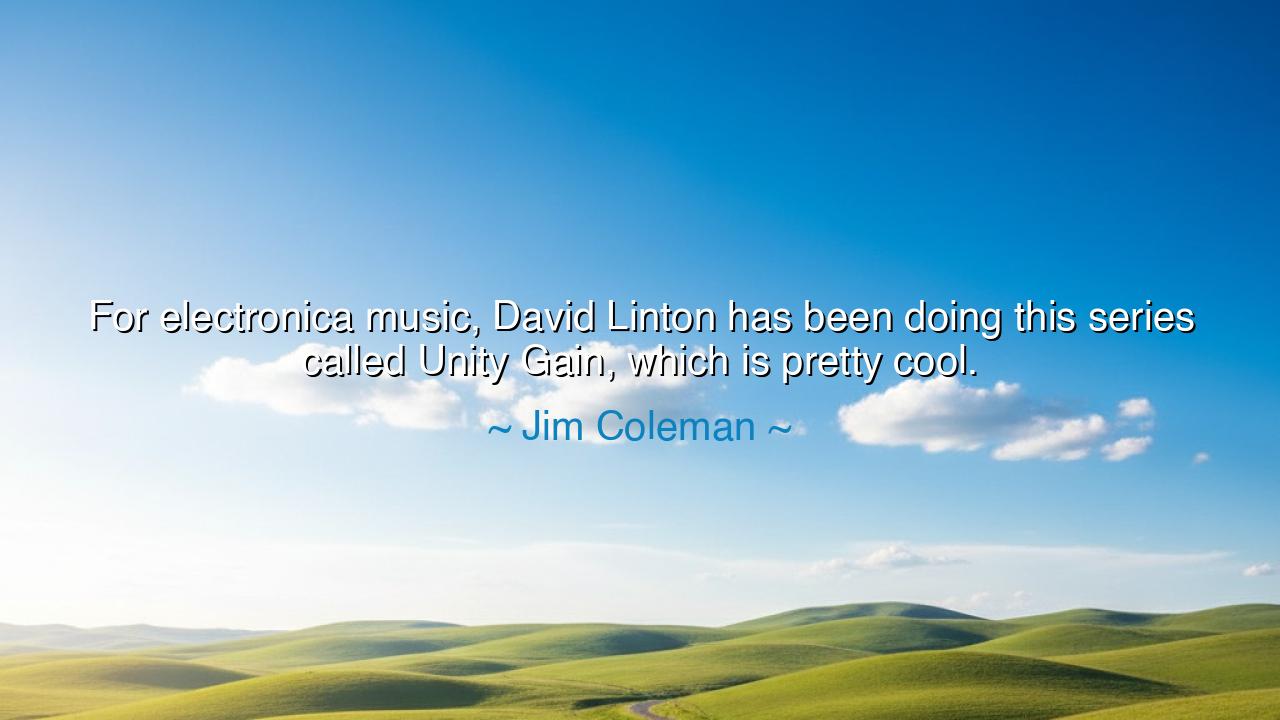
For electronica music, David Linton has been doing this series
For electronica music, David Linton has been doing this series called Unity Gain, which is pretty cool.






In the words of Jim Coleman, we are introduced to a deeper understanding of the world of electronica music, particularly through the work of David Linton and his series, Unity Gain. Coleman’s praise for Linton’s work speaks to the profound impact that art—specifically music—can have on both the individual and society. Unity Gain, in its essence, represents more than just a series of electronic compositions. It is an exploration of harmony, balance, and the connection between sound, technology, and emotion. For Linton, as for many artists, music is not simply about entertainment but about creating something that resonates with the spirit, uniting listeners in a shared experience. The term "unity" is key here; it evokes the idea that music, when done right, brings people together, regardless of the distance between them or the boundaries of time and space.
This idea of unity in music is not foreign to the ancients. From the earliest days of human civilization, music has been seen as a powerful force, capable of uniting communities and stirring the soul. In ancient Greece, music was considered one of the highest forms of art and an essential part of society. The philosopher Pythagoras believed that the harmony of the universe itself was reflected in musical proportions. For him, the mathematical ratios that governed musical intervals were a reflection of divine order. Just as Linton’s Unity Gain explores the balance and connection between sounds, the ancient Greeks understood music as a mirror to the deeper harmony of the cosmos—a force capable of aligning both the body and the soul with the rhythm of the universe.
Similarly, consider the Gregorian chants of the medieval period, where monks used music as a form of meditation and unity with the divine. These chants were not just musical compositions, but prayers sung with the intention of creating a spiritual bond—a connection that transcended individual voices to become one unified sound. Through unity, they sought to experience a connection with something greater than themselves, a force that transcended the mundane and united them with the divine. Linton’s electronica, while different in form, carries a similar ethos: the goal of creating an experience that brings listeners into a state of balance and harmony, a shared connection to the art, the artist, and the audience.
The journey to creating something as impactful as Unity Gain is one of deep dedication and innovation. In the history of music, many pioneers have sought to innovate, pushing the boundaries of sound to express the deeper truths of human existence. Ludwig van Beethoven, for example, was a revolutionary composer who, even in the face of deafness, redefined the sound of classical music, bringing together the delicate intricacies of symphonic music with the raw emotion of the human spirit. Beethoven’s music, much like Linton’s electronica, is about more than just sound—it’s about creating a feeling, an emotional connection, and a shared experience that transcends individual listening. Both artists, in their own time and medium, sought to create not just music, but unity among their listeners.
The lesson here is one of innovation and connection. Just as David Linton uses his series to bring people together through the art of electronica, we too can seek to foster unity and understanding in our lives through the work we do, the relationships we build, and the communities we cultivate. Unity Gain is not merely about the sounds it creates, but about how those sounds resonate with the listener, uniting them with the artist and the collective experience. In our own lives, whether in our personal relationships or our creative endeavors, we must strive to create moments of connection and balance, knowing that the work we do can have a profound impact on the unity of those around us.
In practical terms, this means embracing collaboration in all our endeavors. Whether in art, business, or personal relationships, true progress and fulfillment come not from isolating ourselves but from coming together, combining our talents, and creating something larger than any one individual. Just as Linton’s music explores the balance and unity between sound and silence, we must seek to find harmony between our own desires and the needs of those around us. By working together, we create something more meaningful and lasting than we could alone.
Thus, let us embrace the wisdom of unity and innovation that both Linton and the ancients have shown us. Whether through the beats of electronica or the quiet hum of nature, let us find ways to connect with those around us, to build harmony in our communities, and to create works of lasting value that bring people together. As we move forward, let us remember that unity—whether in art, in action, or in spirit—is the force that binds us all together, giving our efforts meaning and purpose in a world that sometimes feels fragmented and divided.






AAdministratorAdministrator
Welcome, honored guests. Please leave a comment, we will respond soon